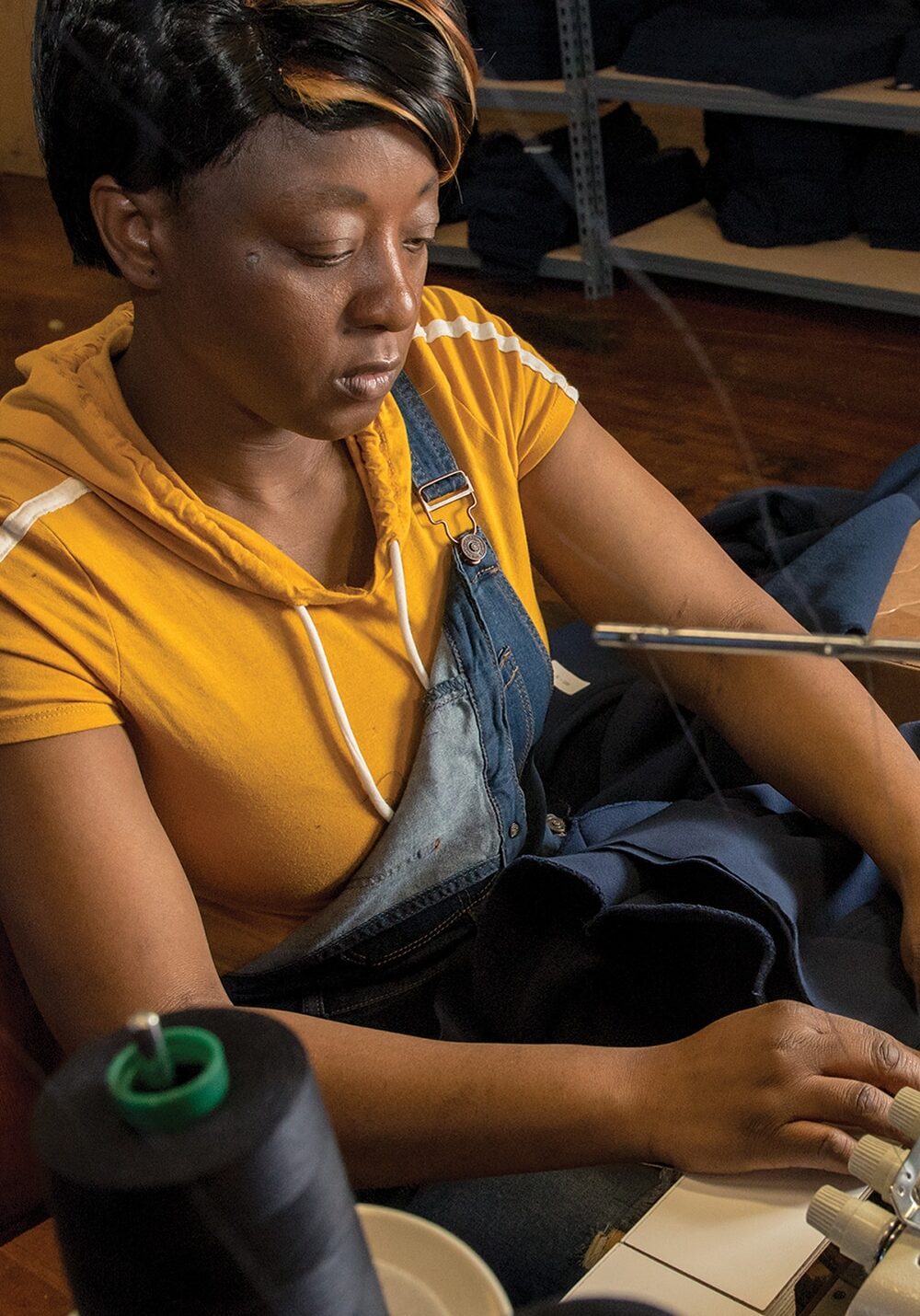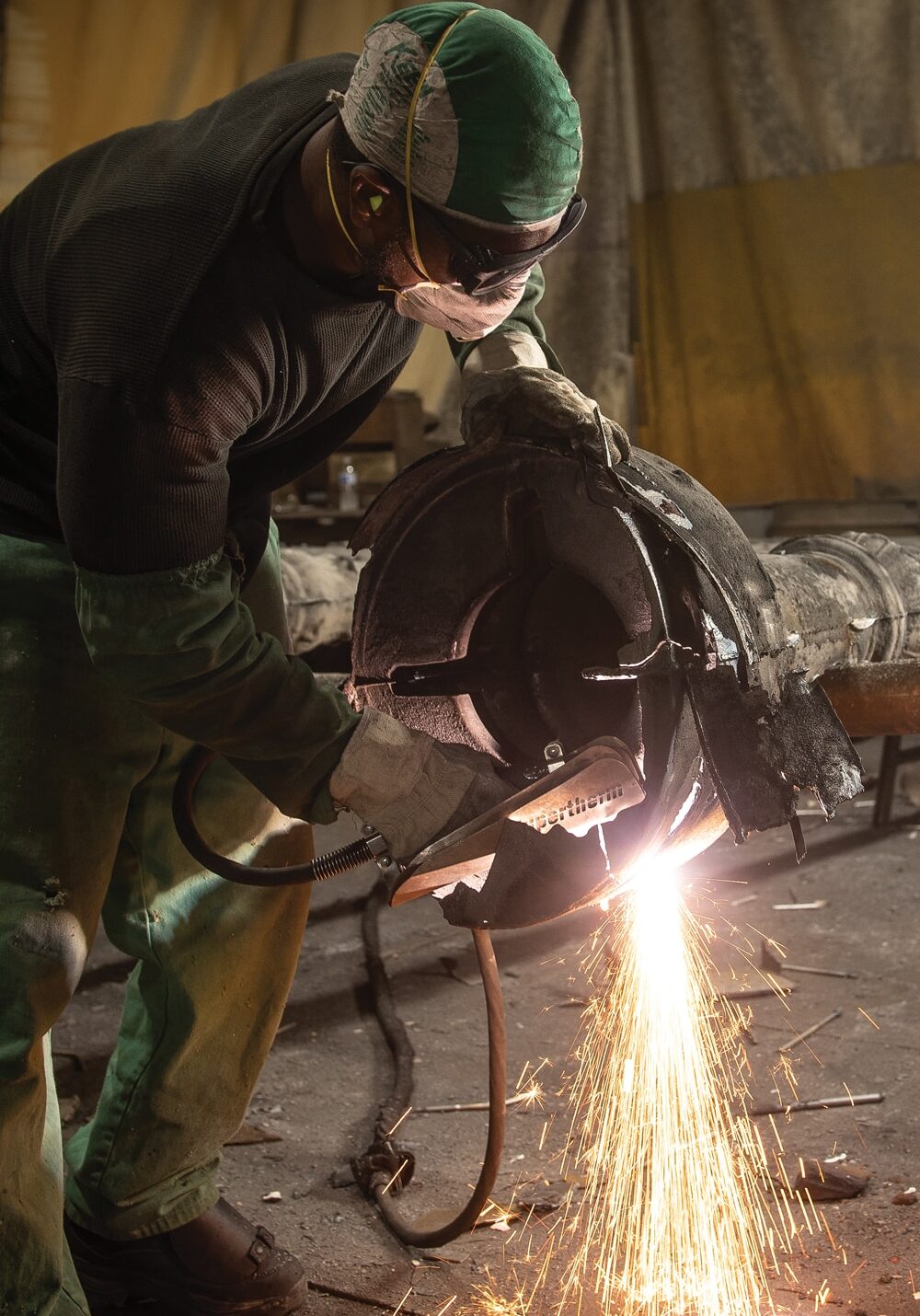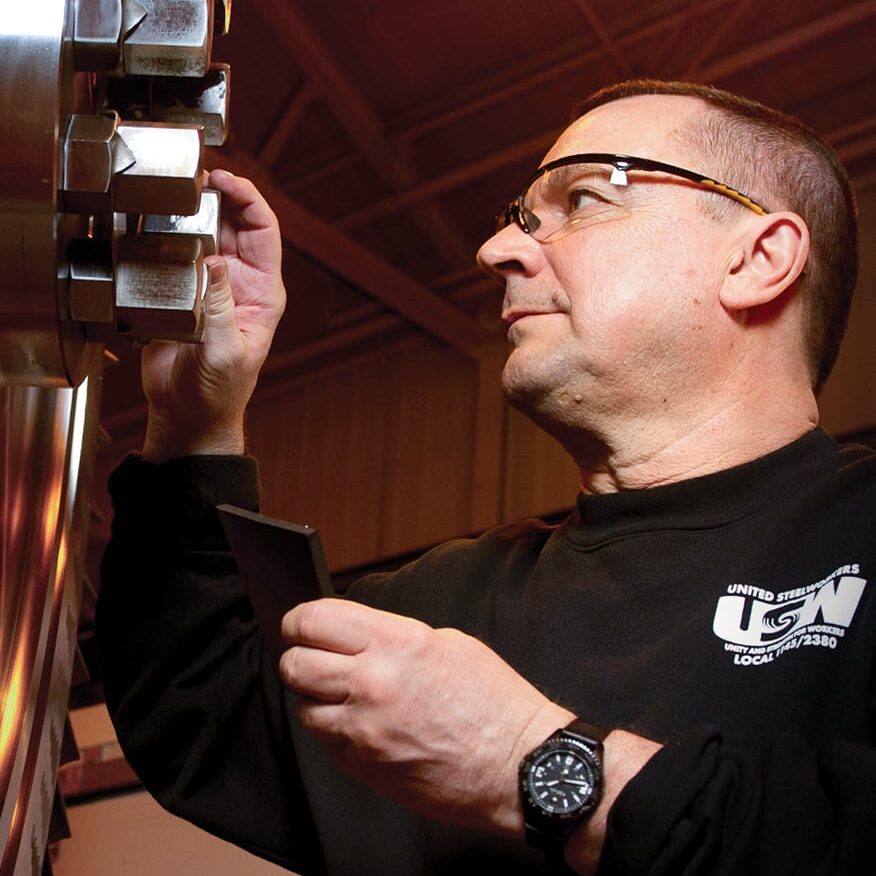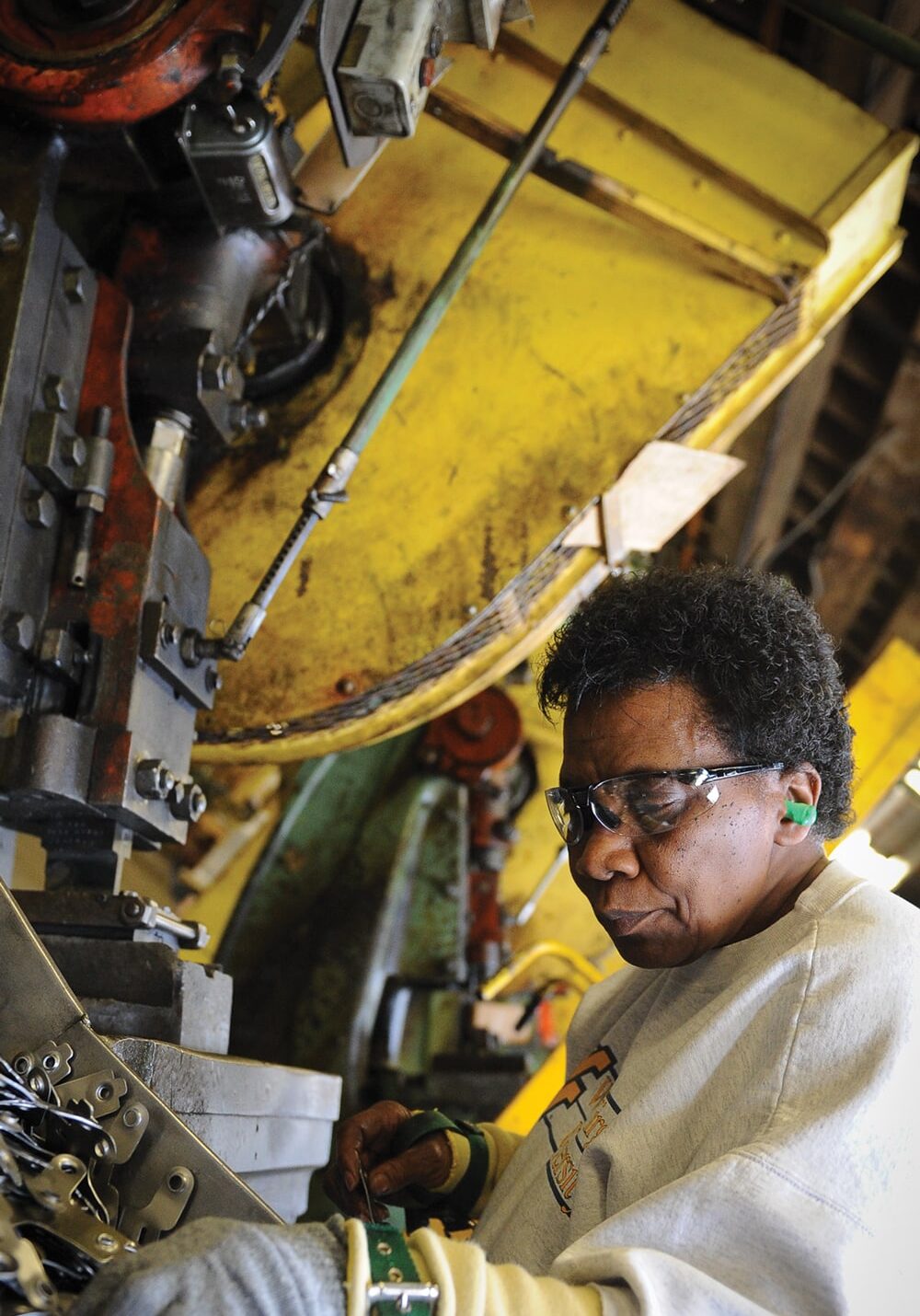The union’s manufacturing workers supply the parts and components that sustain numerous supply chains essential to America’s prosperity and security.
USW manufacturing workers achieved historic victories over the past three years, growing the union’s footprint in evolving industries, racking up forward-looking contract gains and harnessing solidarity to thwart union busters at every turn.
The union’s manufacturing workers supply the parts and components that sustain numerous supply chains essential to America’s prosperity and security. Time and again, local unions leveraged the worker power of the growing post-pandemic economy to bargain record wage increases and raise the national bar on work-life balance, safety and other key issues.
Here’s a look at some of these exceptional agreements:
“USW manufacturing workers achieved historic victories over the past three years, growing the union’s footprint in evolving industries.”
Airboss Flexible Products
The 300 members of Local 690L negotiated their best pay increases in 20 years as Airboss Flexible Products in Auburn Hills, Mich., leaned on their skills and dedication to take the company in new directions.
In addition to winning wage hikes of about 13 percent over four years, workers successfully beat back an attack on their vacation time and maintained quality, affordable health care.
Workers at Airboss long made muffler hangers and other car parts. In the wake of the pandemic, however, the company began branching into the electric vehicle industry and also landed a contract to make rubber boots for the military.
On the heels of these developments, Local 690L parlayed the company’s need for a growing, stable work force into strong gains at the bargaining table.
Amfuel
About 200 members of Local 607L held strong during a four-year-long fight for a fair contract, turning back Amfuel’s demands for dozens of concessions and defeating four company-instigated decertification attempts.
The union members, including many women of color and single moms, attributed their victory to the ironclad bond they share. Some have worked side by side for decades, making bullet- and crash-resistant fuel cells for fighter jets and military helicopters. In addition to camaraderie forged on the job, the workers cross paths in church, the grocery store and other places in their small town of Magnolia, Ark.
The workers saw little reason for worry when an investment group purchased Amfuel in 2018. The company even bragged about giving the workers a greater voice and additional respect for the important role they play in America’s security.
But at the start of negotiations in 2020, the company demanded nearly 70 concessions, including elimination of seniority and the grievance process. The workers refused to give in no matter how long the battle, and just as they were about to go out on an unfair labor practice strike in May 2024, the company surrendered.
The workers gave zero concessions while achieving a contract with significant raises, additional holidays and other enhancements.


BAE
Narrowly averting an unfair labor practice (ULP) strike, members of Local 7687 reached agreement in August 2022 on a new contract reflecting the important role they play in national security.
The five-year agreement increased wages, strengthened retirement security and improved access to vacation time.
About 800 USW members at the BAE complex in York, Pa., make equipment for the military. For example, the company in September 2024 received a $400 million contract for new Bradley Fighting Vehicles, replacing some of those the U.S. sent to Ukraine.
Blue Bird Corp.
About 1,500 workers at Blue Bird Corp. in Fort Valley, Ga., broke new ground not only by organizing in an emerging industry and in a state long hostile to unions but by negotiating a first contract affording them the seat at the table they urgently needed.
The three-year deal provided all union members with wage increases of at least 12 percent, while delivering some of the lowest paid workers increases of as much as 40 percent. The contract, overwhelmingly ratified in May 2024, also established a profit-sharing program and a 401(k) plan with company contributions.
Just as important, the agreement included vital health and safety protections to workers concerned about leaks, pooling water, electrical hazards and other risks at the plant. In addition, the contract established a platform for workers’ input on civil rights, health care, public policy, job creation and other issues.
USW members at Blue Bird make school buses, including the low- and zero-emission models making up a growing percentage of fleets nationwide thanks to billions in subsidies allocated through the Infrastructure Investment and Jobs Act.
This first contract set a solid foundation for a growing work force. With the USW’s support, the Biden administration last year awarded the company $80 million for an expansion anticipated to create hundreds of additional jobs.
Former Acting Labor Secretary Julie Su, a staunch supporter of the USW members at Blue Bird, called the agreement “an example of collective bargaining done right” and proof “that the EV transition and good union jobs go together.”
Bobcat
About 700 workers at the Bobcat plant in Bismarck, N.D., voted to join the USW shortly after the union’s 2022 constitutional convention and then followed up that victory with a first contract in July 2023.
The four-year agreement with Local 566 delivered annual wage increases, required the company to give advance notice for overtime and established a much-needed grievance process. The contract also prohibited mandatory Sunday shifts.
Local 560 members at the Bobcat plant in Gwinner, N.D., assisted with the Bismarck union drive—and then ratified a new contract of their own in December 2022.
That agreement featured wage increases of 18 percent over four years, along with bigger company health care contributions, an improved vacation benefit and other enhancements for about 1,300 workers.
Continental Cement
Workers at Continental Cement in Hannibal, Mo., waged an eight-day unfair labor practice strike in February 2023 but deftly parlayed solidarity and community support into victory at the bargaining table.
The 100 members of Local 11-205 beat back management’s demands for concessions while winning wage increases of 23 percent in a five-year contract. Other wins included ratification bonuses, streamlined job classification for new hires and a new call-out system to reduce the use of contractors.
Dotson Iron Castings
It took a nine-day unfair-labor-practice strike, but about 80 members of Local 142B improved safety and addressed overtime concerns in a new contract with Dotson Iron Castings in Mankato, Minn.
The three-year contract, ratified in August 2023, featured raises of 13 percent. Workers at the 150-year-old foundry make ductile iron castings for agriculture, construction, transportation and other industries.


Huhtamaki Packaging
Local 4-00054 members at Huhtamaki Packaging in Fulton, N.Y., achieved wage increases of 9.5 percent, additional pension contributions and other benefit enhancements in a three-year contract they ratified in February 2024.
The 375 workers also attained another kind of win in the agreement: After years of union advocacy, including repeated discussions at the bargaining table, the company finally agreed to fly the USW flag at the plant.
Members pursued this demand to raise their profile in the community, demonstrate the power of solidarity and show pride in their work.
Hydro Extrusion USA
About 50 USW members at Hydro Extrusion in The Dalles, Ore., secured a three-year contract that ensures the company will continue to invest in them while it also makes major upgrades to its facilities around the country.
Local 9170’s agreement, ratified in January 2024, included general wage increases of 5 percent in the first year, 4 percent in the second and 3 percent in the third. Because of additional wage adjustments in 10 job classifications, however, some members received overall pay increases of 9 percent to 12 percent in the first year.
The contract also included improvements in bereavement language, a 50 percent increase in shift differentials, vacation improvements, additional sick time and double time for all work hours over 60 per week. It also reduced, from 90 days to 30, how long new hires work before receiving benefits.
The company recently invested $27.7 million in its scrap-melting extrusion plant in The Dalles while also planning millions of dollars of upgrades at facilities in Kentucky, Michigan and Pennsylvania.
Rotek Thyssenkrupp
Despite rising health care costs, many USW locals successfully negotiate contracts that maintain quality benefits without increasing workers’ out-of-pocket expenses or contribution levels.
That was just one of the big victories in Local 8565-00’s new contract with Rotek Thyssenkrupp in Aurora, Ohio, where about 75 members make bearings for cranes, ships, the military and other applications.
In addition to holding the line on health care, the contract featured raises of 21.5 percent over five years, along with increases in vacation time and the company’s commitment to bargain hazard pay, safety and related issues in the event of a future pandemic.
The contract, ratified in fall 2023, also included language providing emergency leave for workers affected by domestic violence. As the workers at Rotek showed, USW members continue to lead the way nationally in getting employers to understand the risk of domestic violence and delivering the supports essential to helping survivors get away and stay away—from their abusers.
Tecnocap
About 50 members of Local 152M ratified a new agreement in December 2023 after a battle with Tecnocap that forced the USW to pursue dozens of unfair labor practice charges.
At various points in the four-year dispute, the company in Glen Dale, W.Va., illegally locked out union workers, improperly forced them into longer shifts, and unlawfully slashed health benefits, among numerous other violations that the USW’s Legal Department successfully fought at the National Labor Relations Board (NLRB) and the 4th Circuit Court of Appeals.
The NLRB labeled Tecnocap a “repeat offender” because of its pervasive misconduct.
The workers, who make metal closures, refused to be bullied into a concessionary contract and eventually forced Tecnocap into an agreement providing wage increases, pension gains and other enhancements.
Travis Pattern and Foundry
Members of Local 289M at Travis Pattern and Foundry saw surging demand for the clamps, vacuum tubing and the other products they produce after President Joe Biden signed the Infrastructure Investment and Jobs Act in 2021.
As new orders rolled in, the 100-year-old company in Spokane, Wash., pursued expansion plans and began adding jobs. Workers capitalized on that growth at the bargaining table in summer 2023, winning raises of 15.25 percent over four years while making progress on eliminating a tiered pay system.
The agreement also provided an additional 40 hours of vacation time each year, along with pension upgrades, an additional holiday, improved health and safety language, and an allowance for prescription safety glasses.
Local 289M, which represents about 440 workers at Travis and 60 at another manufacturer, helped advocate for the national infrastructure law that’s now helping to sustain their livelihoods.
The new contract included forward-looking provisions for union leave, ensuring members will have the time needed to do more of this kind of vital union work in the future.
Twin Rivers Paper
Members of Local 01438 achieved progress on pay and work-life balance in their most recent agreement at Twin Rivers Paper in Little Falls, N.Y.
The contract, ratified in June 2024, delivered wage increases of 10 percent over three years and maintained quality, affordable health care for about 50 workers. It also compressed the vacation schedule—increasing vacation time for new hires and for workers who reach two, five, 10, 18 and 27 years of service.
Under the old agreement, for example, workers earned six weeks of vacation upon reaching 30 years with the company. Now, they earn six weeks at year 27.
